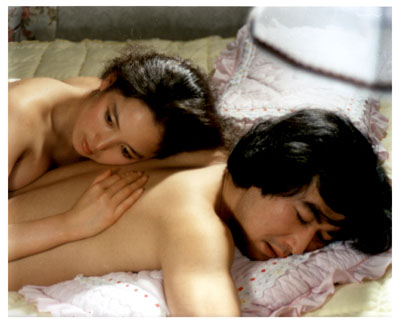[HanCinema's Film Review] "Madame Aema" + Full Movie
 By Panos Kotzathanasis | Published on
By Panos Kotzathanasis | Published on
"Madame Aema" (aka "The Ae-ma Woman") is a rather significant title for the Korean movie industry. Driven and inspired by the success of the "Emmanuelle" movie, it was the first erotic film to be made after South Korea's government began relaxing its control of the industry, and the most sexually explicit film up to be shot in the country at the time. Its commercial success, which deemed it one of the only two films to sell more than 100,000 tickets in Seoul in1982, resulted in at least 10 sequels, making it the longest-running series in the history of Korean cinema, and a trend of similarly erotic productions.
Advertisement
The film starts with Ae-ma riding a train, which is soon revealed to be heading towards the prison her husband, Sin Hyeon-woo, is incarcerated in, for involuntary homicide. A series of flashbacks shed more light to the prior events and reveal an abusive marriage, with Hyeon-woo having frequent affairs with other women, and the fateful night Ae-ma decided to confront him, which ended up in violence, both in the house and when he decided to drown his sorrows in a bar.
Ae-ma is soon revealed as a woman everyone lusts, including her girlfriends, while her whole social circle insists she should divorce her husband, although she is unable to do so. At the same time, her parents-in-law have taken away her kid, in a rather impactful sequence that took place shortly after her husband was convicted, while she was experiencing intense depression.
Nevertheless, Ae-ma soon indulges in a series of erotic relationships. While on a train, she meets Kim Dong-yeob, a student of art. A bit later on, she runs into an old boyfriend, Kim Moon-oh, who lives in the same apartment complex. At the same time, she still cannot find the strength to divorce her husband. Eventually, she makes a decision, but at this point, Hyeon-woo is released from prison.
In terms of narrative, the film does not have much to tell. After the introductory part, the story simply follows Ae-ma in her various sexual endeavors, which feature men, women, her on her own, and occasionally horses, in a style very close to the legendary scene from "Bolero". Perhaps the only comments worth mentioning are those revolving around the place of woman in Korean society, which in this case, is portrayed as a slave to the males' whims, with the whole concept with Ae-ma's child highlighting the fact quite eloquently. A few comments on desire and cheating while married also appear, but are lost in the permeating eroticism.
In cinematic terms, however, Jeong In-yeob's work is quite interesting, particularly in combination with the excellent job of DP Lee Suk-kee. In that fashion, both men benefit the most by Ahn So-young's evident beauty and sensualism, with the camera highlighting her in every pose possible, all of which emerge as quite captivating, in a style quite close to the one implemented in "Emmanuelle". Furthermore, the various sex scenes are shot with different aesthetics each time, occasionally being more artistic and occasionally softly pornographic, but always tasteful and with an ever-changing use of angles and colors that borders on the experimental.
Furthermore, the exterior shots, which include beaches, forests, fields (and horses) are also very well shot, occasionally inducing the film with an almost idyllic sense. Lastly, the crime scene is also impressive, with Jeong using slow motion, intense coloring and intense contrast successively, in another memorable sequence. Lastly, the red color that seems to dominate the movie is well implemented, in resonance with the film's aesthetics. Kim Hee-su's editing is also accomplished, with the connection of the scenes not allowing the sensualism to waver, although the flashbacks could have been presented and placed a bit better.
Evidently, Jeong In-yeob's purpose was to use the style of Emmanuelle and the permeating sexuality of Ahn So-young to titillate, but his cinematic approach elevates the film much higher than a simple erotic movie, additionally justifying its success and the fact that it still looks quite good, almost 40 years after its initial screening.
Review by Panos Kotzathanasis
___________
"Madame Aema" is directed by Jeong In-yeob, and features Ahn So-young, Im Dong-jin, Hah Myung-joong, Ha Jae-young, Kim Jin-kyu, Jun Sook. Release date in Korea: 1982/02/06.
 Panos Kotzathanasis
Panos Kotzathanasis
Panos Kotzathanasis is a film critic and reviewer specialising in East Asian Cinema. He is the founder of Asian Film Vault, administrator of Asian Movie Pulse and also writes for Taste of Cinema, Eastern Kicks, China Policy Institute and Filmboy. You can follow him on Twitter and Facebook. Panos Kotzathanasis can be contacted via sinkazama82@gmail.com.


